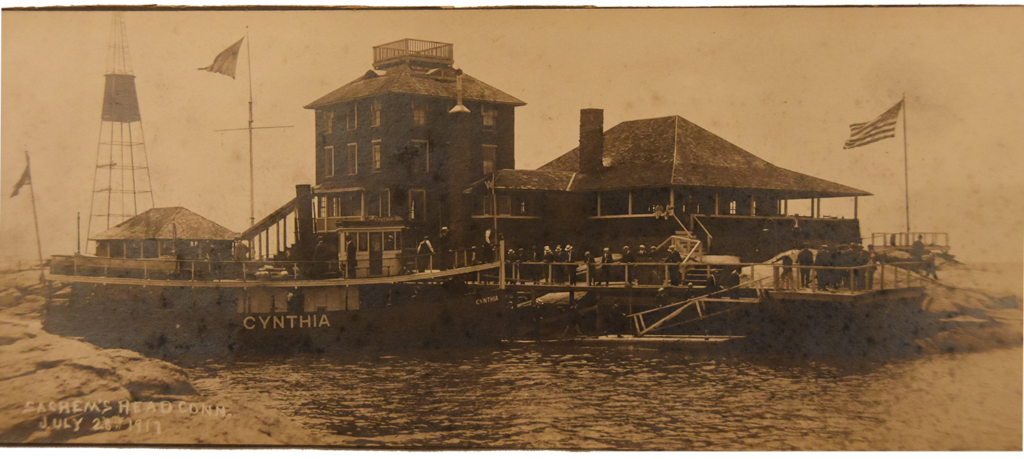SHYC History

SHYC – July 1917
As presented by Edna Seward Stevens, born 1878, Wellesley Class of 1900, to The Whitfield Society in June 1931:
Probably the natural harbor at Sachem’s Head has been the main reason for its becoming again a summer resort. More and more people built cottages and had boats to be cared for. Of course if you have a boat and I have a boat the question arises, “Which is the faster?” That perfectly natural question was the reason for the forming of the present Yacht Club. In the summer of 1896 Aaron Hill owner of the Sachem John Elton Wayland owner of the Spindrift Edward C. Seward owner of the Sweetheart and William E. Peck owner of the Helena founded a yacht club of four members all officers in the order named – Commodore, vice commodore, Fleet Captain, Sec & Treas. On May 14, 1897 articles of association were adopted and Robert B. Seward elected to membership. Later Rob’t Mitchell, A. H. Wilcox, W. C. Clark (Leetes Island) C. N. Wayland (Mrs. Wayland’s father) Harry Bartholomew, Dr. Robert Lander and a Dr. Joseph Pullman were admitted. Races were started that year from Merriman’s dock. (Now Hoffman’s) Twelve boats started in the first race. The first annual regatta on Labor Day found seventeen boats entered. The first annual meeting of the club was held at the Pierce Cottage. Mr. Seward was appointed chairman of a committee to secure a club site. It is due to his efforts that Chimney Corner was acquired. Many who have bought property at Sachem’s Head in years past know that there are old titles reaching back almost to prehistoric times and that boundaries were much more loosely held than now. Securing title to that rocky island meant following up many families who seemed to have some claim to the rocks. A corporation was formed under state laws to finance the purchase of the site and building was begun. The Club House was formally opened June 18th 1898. Capt Oliver Brooks was the first superintendent. Membership has increased greatly since the early days but the interest and enthusiasm in regard to racing was never stronger than at that time when from twelve to twenty boats flying the yacht club flag used to cruise each summer – carrying the name and fame of the club to all points of importance east and west along the Sound.
Life at Sachem’s Head nearly 100 years ago was very gay. Fifty years ago it was what we made it and continued so even after the Yacht Club brought more in the way of social activities. Now, many go away from the water for entertainment. Of course the automobile has made that possible. There wasn’t much temptation to leave the shore when walking was the chief mode of transportation. A hay wagon with the horse and a load of twenty-five young people couldn’t go very far away and return before “midnight.”
One of the best things about Sachem’s Head is that the epithet “Summer People” has lost its flavor of unpleasantness for the ties that bind those who live here three months to those who live here twelve are very close.
i

A BRIEF HISTORY OF THE SACHEMS HEAD YACHT CLUB
Whenever two sailboats meet , there is always a race , even if it is only in one of the cockpits. Such was the case in those formative years in the late 1800’s. The Club was founded in 1896, and the flag was designed in1897. The SHYC Corporation was founded in 1898 in order to fund and build the Clubhouse. Building activity went on with additions till 1901. In 1902 a windmill and ‘water tower’ were added. Various races ,regattas, and cruises were held from Rhode Island to New York. The breakwater was started in 1908 , “and the rock sunk into the mud as fast as it was dropped overboard”. The Hurricane of 1938 took off the top floor of the Clubhouse , and gave us the structure we basically have today. There have been any number of classes raced at the SHYC. There were the ‘Sachem Headers’ , a gaff rigged boat. There have been Zips , Stars , Eastern Interclubs , Lightnings , and the many classes racing today. The Sachems Head Yacht club prides itself on being a sailing club with a great ‘junior program’ to continue this tradition.
-Past Commodore Peter Johnson